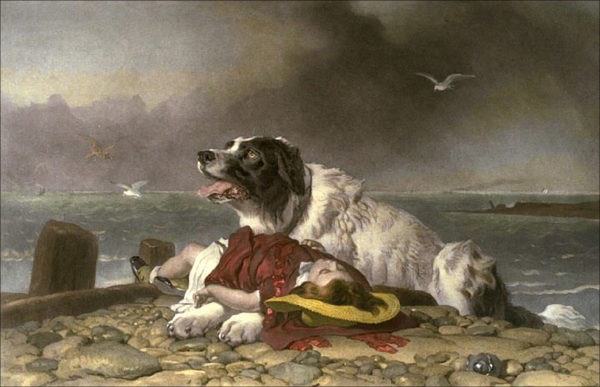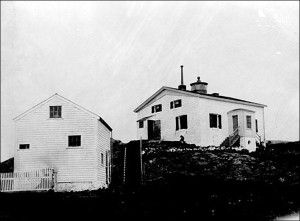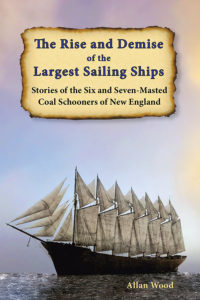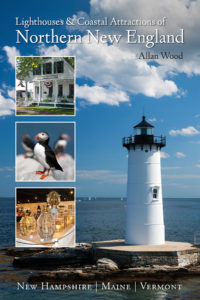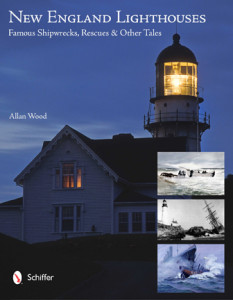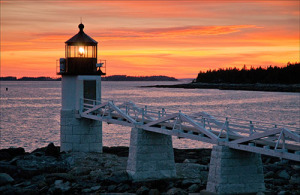Lighthouse Keeper’s Rescue Dog, Milo, from Massachusetts
Gains World Attention from Painting
George B. Taylor was the first keeper at Egg Rock lighthouse, located a mile from Nahant on the northern shore of Massachusetts. When he brought his family to Egg Rock Island, he also got their loving dog, Milo, in 1855. Many lighthouse keepers owned dogs for companionship due to the solitary job of managing and maintaining a lighthouse. He was a breed mix between a Newfoundland and a St. Bernard, making him a rather large animal. Although the lighthouse is no longer present today, the stories and the famous painting of Milo have been preserved over the years.
As the masons were completing the finishing touches on the lighthouse, they were pretty fond of the playful animal. They left an opening in the masonry, which served as Milo’s private entranceway to the lighthouse.
Milo adapted rather quickly to the wildlife on the island. He was an excellent swimmer and very independent. One day, as Keeper Taylor took a shot at an approaching Loon for dinner, Milo started a long chase after the wounded bird. Milo was soon out of sight, hunting for the prize as the seabird kept trying to fly away. Darkness approached, and the Keeper and his family feared that Milo had gotten into some trouble in his escapade. The Taylors finally went to sleep, worrying that the dog had drowned. The following afternoon, Milo was sighted in the water heading towards the island from the Nahant shoreline. The dog had apparently missed the sight of the tiny rock island and lighthouse in the night and ended up on the shore of Nahant, where he stayed the night and then apparently swam to the island the next day.
In foggy weather, Milo would constantly bark at any vessels approaching the lighthouse, becoming an additional fog signal. Keeper Taylor claimed that Milo was involved with assisting in the rescue of several children from drowning near the island.
Milo was also a favorite of local fishermen, as they would come out to the lighthouse and tie large pieces of cod to pieces of wood and set them adrift. The dog would swim out from the shore to retrieve the floating fish, which sometimes were sent adrift as far as a mile from the island, and then bring them to the Taylors. The Taylors would then cook the presents for dinner that night.
Milo’s fame spread across the Atlantic, where he captivated the interest of a well-known English animal painter, Sir Edwin Henry Landseer. Landseer was granted permission by Keeper Taylor to create a painting of Milo with Taylor’s young son, Fred. The painting displayed Milo over a young child resting between the dog’s large paws as if the child had just been saved. The painting, entitled Saved, became a powerful symbol of the lighthouse service and became internationally famous.
Hug your pets!
Allan Wood
Today, Egg Rock lighthouse has been removed, and the island is used as a bird sanctuary due to the efforts of Massachusetts Senator Henry Cabot Lodge.
Exploring Nahant
Nahant is a small coastal town on a tiny island in Massachusetts, just northeast of Boston, connected by a causeway. Besides driving around this little community along Lynn Shore Drive for some seaside views, take the Nahant Road that connects Nahant to the mainland and enjoy Nahant Beach, which has over 67 acres to explore, among other nearby beaches and specialty shops. Lodge Park is also along the seaside, or you can walk around the Nahant Thicket Wildlife Sanctuary. Egg Rock Island, where the lighthouse was located, is about a mile from the peninsula and is not open to the public.
Books to Explore
The Rise and Demise of the Largest Sailing Ships: Stories of the Six and Seven-Masted Coal Schooners of New England. In the early 1900s, New England shipbuilders constructed the world’s largest sailing ships amid social and political reforms. These giants were the ten original six-masted coal schooners and one colossal seven-masted vessel, built to carry massive quantities of coal and building supplies and measured longer than a football field! This book, balanced with plenty of color and vintage images, showcases the historical accounts that followed these mighty ships.
Available in paperback, hardcover, and as an eBook for all devices.

Book – Lighthouses and Coastal Attractions in Southern New England: Connecticut, Rhode Island, Massachusetts
My 300-page book, Lighthouses and Coastal Attractions of Southern New England: Connecticut, Rhode Island, and Massachusetts, provides memorable human interest stories from each of the 92 lighthouses. You can explore plenty of indoor and outdoor coastal attractions, including whale watching excursions, lighthouse tours, parks, museums, and even lighthouses you can stay overnight. You’ll also find plenty of stories of hauntings around lighthouses.
My 300-page book, Lighthouses and Coastal Attractions of Northern New England: New Hampshire, Maine, and Vermont, provides special human interest stories from each of the 76 lighthouses, along with plenty of indoor and outdoor coastal attractions you can explore and tours. Attractions and tours include whale watching, windjammer sailing tours, lighthouse tours, unique parks, museums, and lighthouses you can stay overnight. There are also stories of haunted lighthouses in these regions.
The story of Milo is included, among a few other famous animal stories, with over 50 other stories in my book New England Lighthouses: Famous Shipwrecks, Rescues & Other Tales. This image-rich book also contains vintage images provided by the Coast Guard and various organizations and paintings by six famous artists of the Coast Guard.
You’ll find this book and the lighthouse tourism books from the publisher Schiffer Books or in many fine bookstores like Barnes and Noble.
Copyright © Allan Wood Photography; do not reproduce without permission. All rights reserved.
Join, Learn, and Support The American Lighthouse Foundation
